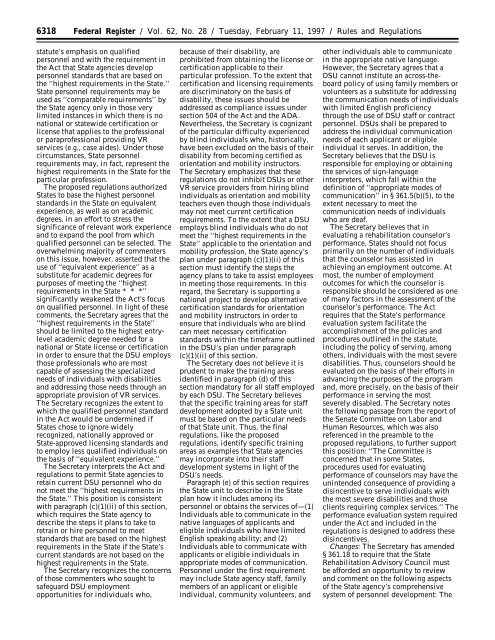federal register - U.S. Government Printing Office
federal register - U.S. Government Printing Office
federal register - U.S. Government Printing Office
Create successful ePaper yourself
Turn your PDF publications into a flip-book with our unique Google optimized e-Paper software.
6318 Federal Register / Vol. 62, No. 28 / Tuesday, February 11, 1997 / Rules and Regulationsstatute’s emphasis on qualifiedpersonnel and with the requirement inthe Act that State agencies developpersonnel standards that are based onthe ‘‘highest requirements in the State.’’State personnel requirements may beused as ‘‘comparable requirements’’ bythe State agency only in those verylimited instances in which there is nonational or statewide certification orlicense that applies to the professionalor paraprofessional providing VRservices (e.g., case aides). Under thosecircumstances, State personnelrequirements may, in fact, represent thehighest requirements in the State for theparticular profession.The proposed regulations authorizedStates to base the highest personnelstandards in the State on equivalentexperience, as well as on academicdegrees, in an effort to stress thesignificance of relevant work experienceand to expand the pool from whichqualified personnel can be selected. Theoverwhelming majority of commenterson this issue, however, asserted that theuse of ‘‘equivalent experience’’ as asubstitute for academic degrees forpurposes of meeting the ‘‘highestrequirements in the State * * *’’significantly weakened the Act’s focuson qualified personnel. In light of thesecomments, the Secretary agrees that the‘‘highest requirements in the State’’should be limited to the highest entrylevelacademic degree needed for anational or State license or certificationin order to ensure that the DSU employsthose professionals who are mostcapable of assessing the specializedneeds of individuals with disabilitiesand addressing those needs through anappropriate provision of VR services.The Secretary recognizes the extent towhich the qualified personnel standardin the Act would be undermined ifStates chose to ignore widelyrecognized, nationally approved orState-approved licensing standards andto employ less qualified individuals onthe basis of ‘‘equivalent experience.’’The Secretary interprets the Act andregulations to permit State agencies toretain current DSU personnel who donot meet the ‘‘highest requirements inthe State.’’ This position is consistentwith paragraph (c)(1)(ii) of this section,which requires the State agency todescribe the steps it plans to take toretrain or hire personnel to meetstandards that are based on the highestrequirements in the State if the State’scurrent standards are not based on thehighest requirements in the State.The Secretary recognizes the concernsof those commenters who sought tosafeguard DSU employmentopportunities for individuals who,because of their disability, areprohibited from obtaining the license orcertification applicable to theirparticular profession. To the extent thatcertification and licensing requirementsare discriminatory on the basis ofdisability, these issues should beaddressed as compliance issues undersection 504 of the Act and the ADA.Nevertheless, the Secretary is cognizantof the particular difficulty experiencedby blind individuals who, historically,have been excluded on the basis of theirdisability from becoming certified asorientation and mobility instructors.The Secretary emphasizes that theseregulations do not inhibit DSUs or otherVR service providers from hiring blindindividuals as orientation and mobilityteachers even though those individualsmay not meet current certificationrequirements. To the extent that a DSUemploys blind individuals who do notmeet the ‘‘highest requirements in theState’’ applicable to the orientation andmobility profession, the State agency’splan under paragraph (c)(1)(ii) of thissection must identify the steps theagency plans to take to assist employeesin meeting those requirements. In thisregard, the Secretary is supporting anational project to develop alternativecertification standards for orientationand mobility instructors in order toensure that individuals who are blindcan meet necessary certificationstandards within the timeframe outlinedin the DSU’s plan under paragraph(c)(1)(ii) of this section.The Secretary does not believe it isprudent to make the training areasidentified in paragraph (d) of thissection mandatory for all staff employedby each DSU. The Secretary believesthat the specific training areas for staffdevelopment adopted by a State unitmust be based on the particular needsof that State unit. Thus, the finalregulations, like the proposedregulations, identify specific trainingareas as examples that State agenciesmay incorporate into their staffdevelopment systems in light of theDSU’s needs.Paragraph (e) of this section requiresthe State unit to describe in the Stateplan how it includes among itspersonnel or obtains the services of—(1)Individuals able to communicate in thenative languages of applicants andeligible individuals who have limitedEnglish speaking ability; and (2)Individuals able to communicate withapplicants or eligible individuals inappropriate modes of communication.Personnel under the first requirementmay include State agency staff, familymembers of an applicant or eligibleindividual, community volunteers, andother individuals able to communicatein the appropriate native language.However, the Secretary agrees that aDSU cannot institute an across-theboardpolicy of using family members orvolunteers as a substitute for addressingthe communication needs of individualswith limited English proficiencythrough the use of DSU staff or contractpersonnel. DSUs shall be prepared toaddress the individual communicationneeds of each applicant or eligibleindividual it serves. In addition, theSecretary believes that the DSU isresponsible for employing or obtainingthe services of sign-languageinterpreters, which fall within thedefinition of ‘‘appropriate modes ofcommunication’’ in § 361.5(b)(5), to theextent necessary to meet thecommunication needs of individualswho are deaf.The Secretary believes that inevaluating a rehabilitation counselor’sperformance, States should not focusprimarily on the number of individualsthat the counselor has assisted inachieving an employment outcome. Atmost, the number of employmentoutcomes for which the counselor isresponsible should be considered as oneof many factors in the assessment of thecounselor’s performance. The Actrequires that the State’s performanceevaluation system facilitate theaccomplishment of the policies andprocedures outlined in the statute,including the policy of serving, amongothers, individuals with the most severedisabilities. Thus, counselors should beevaluated on the basis of their efforts inadvancing the purposes of the programand, more precisely, on the basis of theirperformance in serving the mostseverely disabled. The Secretary notesthe following passage from the report ofthe Senate Committee on Labor andHuman Resources, which was alsoreferenced in the preamble to theproposed regulations, to further supportthis position: ‘‘The Committee isconcerned that in some States,procedures used for evaluatingperformance of counselors may have theunintended consequence of providing adisincentive to serve individuals withthe most severe disabilities and thoseclients requiring complex services.’’ Theperformance evaluation system requiredunder the Act and included in theregulations is designed to address thesedisincentives.Changes: The Secretary has amended§ 361.18 to require that the StateRehabilitation Advisory Council mustbe afforded an opportunity to reviewand comment on the following aspectsof the State agency’s comprehensivesystem of personnel development: The


